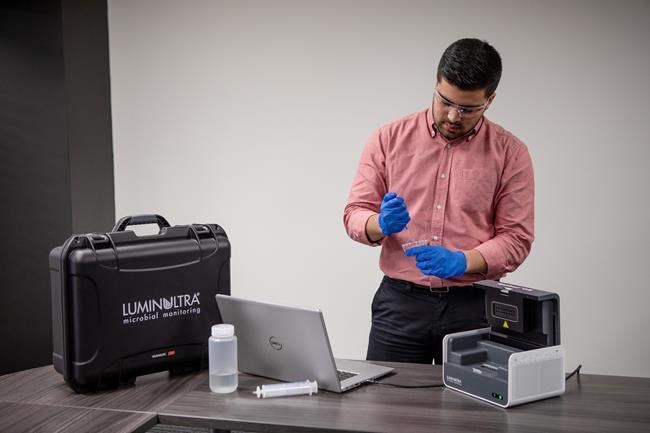FREDERICTON — A Fredericton-based company has filed a patent for a technology it says can help provide rapid, early detection of COVID-19 in a community by testing its sewage.
LuminUltra and researchers at Dalhousie University have developed a system they say is portable and less costly than traditional laboratory testing. Company CEO Pat Whalen said his 4.5-kilogram device can make testing accessible to communities with limited or no access to lab facilities.
"It's all about giving us an earlier warning," Whalen said in a recent interview. "This is a lower-cost solution that is far more deployable and portable and is able to be used in far more places."
Whalen said while a traditional COVID-19 lab test takes about eight hours to complete, his company's device can produce on-site results within 90 minutes to two hours. The company's technology is simpler to use than traditional tests, he said, adding that tests can be conducted by "any kind of lab technician" as opposed to a highly trained chemist.
Whalen said the technology can be used by sewage treatment plants to detect COVID-19 in wastewater. But it can be used more widely, he explained, to test the waste of individual buildings located on university campuses, or of hospitals and seniors residences.
"There's a tremendous amount of flexibility with something that can be picked up and taken to where it needs to be," he said.
Several countries have tested wastewater for early signs of a COVID-19 outbreak. The Netherlands and France, for example, used such testing in the early days of the pandemic, and according to non-peer reviewed studies, both were able to detect traces of the virus in wastewater before widespread outbreaks were confirmed.
Parts of the United States, Australia and Israel have done the same, and earlier this month, the University of Guelph tested wastewater from campus residences for early signs of the novel coronavirus.
Amina Stoddart, an assistant engineering professor at Dalhousie University, said LuminUltra's system was refined by testing wastewater samples supplied by Halifax's water utility.
Stoddart described sewage as a "biological matrix" that can change over time. The key to accurate results, she said, is to analyze fresh wastewater as quickly as possible before its microbial composition changes.
She said the focus of her research was in "cleaning up" wastewater samples in order to extract RNA -- a molecule similar to DNA -- and in accurately quantify the presence of the virus. Stoddart said it was exciting to help develop testing that can be "done really anywhere."
"You can imagine that there are communities within Canada that are challenged logistically in terms of sending a viable sample to a lab to be analyzed, so I think that's a huge advantage of this method," she said.
Whalen said his company is trying to commercialize its technology but didn't give details on when it would be available. He said he hoped to launch his testing device soon.
This report by The Canadian Press was first published Oct. 26, 2020.
-- By Keith Doucette in Halifax.
The Canadian Press



